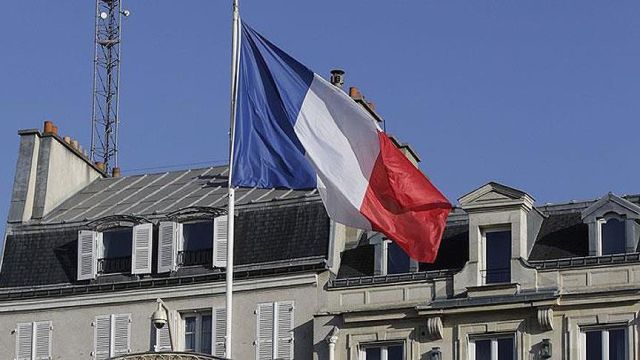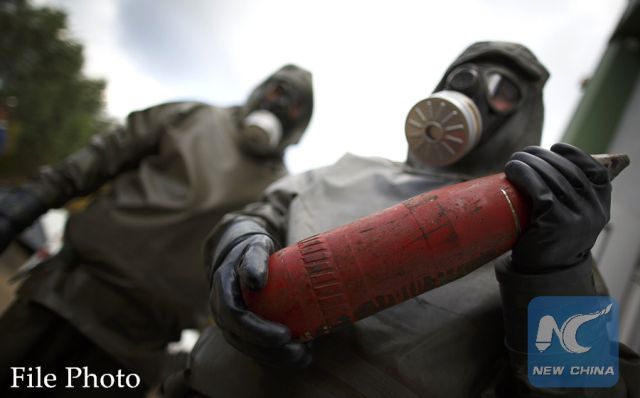
by admin | May 25, 2021 | Muslim World
 Baghdad : An Iraqi scientist has claimed that he supervised the manufacture of lethal toxins for the Islamic State (IS) terror group for a period of 15 months, The Washington Post reported.
Baghdad : An Iraqi scientist has claimed that he supervised the manufacture of lethal toxins for the Islamic State (IS) terror group for a period of 15 months, The Washington Post reported.
In 2014, the IS seized Mosul, the country’s second largest city, and made their way through every government office, rounding up workers and managers who had not yet fled the city and pressing them into service.
Suleiman al-Afari, a geologist with Iraq’s Ministry of Industry and Minerals, was then offered a new job. He knew little about the subject, but he accepted the assignment nonetheless.
“Do I regret it? I don’t know if I’d use that word,” Afari, who was captured by .S and Kurdish soldiers in 2016 and is now a prisoner in Irbil, the capital of Iraq’s semiautonomous Kurdish region, told The Post on Monday.
“They had become the government and we now worked for them… We wanted to work so we could get paid.”
Afari, 52 and on death row, recounted his recruitment and life under the IS in a rare interview from inside the fortress-like headquarters of the Kurdistan Regional Government’s Counterterrorism Department.
He is among the few known participants in the IS’ chemical weapons programme to be captured alive.
He described the terrorist group’s successful attempts to make sulphur mustard – a first-generation chemical weapon that inflicted tens of thousands of casualties during the World War I – as part of an ambitious, little-understood effort to create novel weapons and delivery systems to defend the IS’ territory.
“They didn’t force anyone,” Afari told The Washington Post, recounting his decision to take up the assignment. “I was afraid that I would lose my job. Government jobs are hard to get and it was important to hang on to it.”
Afari’s role was to organise a supply chain for mustard gas, outfitting a small cluster of labs and workshops.
Weapons created by the IS were used in scores of attacks on soldiers and civilians in Iraq and Syria, collectively inflicting hundreds of casualties.
Progress on the programme appears to have stalled in early 2016, after US and Iraqi leaders launched an aggressive campaign to destroy production facilities and kill or capture its leaders.
But according to some Iraqi officials, the IS moved equipment and chemicals from Iraq to Syria in 2016 and some of it may have been buried or hidden, The Washington Post added.
—IANS

by admin | May 25, 2021 | World
 By Yusuf Ozcan,
By Yusuf Ozcan,
Paris: French President Emmanuel Macron said Tuesday he would order a military strike if any evidence emerges that the Bashar al-Assad regime used chemical weapons against civilians in Syria.
Speaking to reporters at Elysee Palace, Macron said the use of chemical weapons against civilians in Syria is France’s “red line”.
He said French security forces have so far not obtained any evidence on the use of chemical weapons against the civilian population, adding they are “seriously following” the matter.
Macron spoke by phone to Russian President Vladimir Putin on Friday and urged him to call on the Assad regime to “put an end to the unsustainable deterioration of the humanitarian situation in Eastern Ghouta and Idlib”.
Syria has been locked in a devastating civil war since March 2011, when the Bashar al-Assad regime cracked down on pro-democracy protests with unexpected ferocity. While UN officials say hundreds of thousands of people have been killed in the conflict, Syrian regime officials say the death toll is closer to 10,000.
—AA

by admin | May 25, 2021 | World
 By Hajer M’tiri,
By Hajer M’tiri,
Paris: France on Tuesday announced it was sanctioning nearly 25 people and companies involved in the transfer of materials and substances that may have been used to manufacture chemical weapons in Syria.
Published in the government’s official gazette, the list includes the names and addresses of traders and businesses mostly based in Beirut, Damascus and Paris. A Chinese businessperson from the export hub of Guangdong is also in the list.
The penalty, which consists of asset freezes, targets Syrian, Lebanese and Canadian individuals with companies operating in a number of sectors, such as electronics, logistics, shipping, and metal.
They have all been targeted for being “active intermediaries” of the Syrian Scientific Studies and Research Center — the Syrian regime’s chemical weapons incubator — by “facilitating the supply of goods involved in the production of chemical weapons, including toxic synthetics, such as sarin gas,” French Foreign Minister Jean-Yves Le Drian and Finance Minister Bruno Le Maire explained in a joint statement.
The list, however, does not include any Syrian officials working for the Assad regime.
The ministers pointed out they lacked sufficient evidence to “take this up to the political level”.
The move comes as Paris hosts 29 foreign ministers and diplomats who have come together to create an “International Partnership against Impunity for the Use of Chemical Weapons”.
The series of commitments stated in the declaration of principles aims at strengthening cooperation in the fight against impunity for those who use or develop chemical weapons, according to a French Foreign Ministry statement.
“They [leaders] will agree to make any information they were able to obtain on the perpetrators of chemical attacks available to the international community, international investigative organizations (UN, OPCW), and the public,” the statement said, adding that the partnership in no way intended to replace existing international mechanisms, nor did it plan to conduct its own investigations.
Syria has been locked in a vicious civil war since early 2011, when the Bashar al-Assad regime cracked down on pro-democracy protests with unexpected ferocity.
Hundreds of thousands of civilians have been killed in the conflict, mainly by regime airstrikes indiscriminately targeting opposition-held areas, while millions more have been displaced.
During the conflict, the Assad regime has been accused many times by international actors of targeting Syrian civilians with chemical weapons.
—AA

by admin | May 25, 2021 | World
 Moscow : The last chemical munitions from Russian arsenals of chemical weapons were liquidated in the southwest of Russia, officials said on Wednesday.
Moscow : The last chemical munitions from Russian arsenals of chemical weapons were liquidated in the southwest of Russia, officials said on Wednesday.
Mikhail Babich, Chairman of the State Commission on Chemical Disarmament, reported to Russian President Vladimir Putin that the elimination process was completed ahead of schedule.
“We can say without any unnecessary pathos that this is indeed a historical event, given the enormous volume of munitions we have inherited from Soviet times,” Xinhua quoted Putin as saying.
Experts said the arsenal of chemical weapons could destroy all life on earth several times, according to the president.
“This is a huge step towards making the modern world more balanced and more secure,” Putin said.
Recalling that Russia was among the first to sign the Chemical Weapons Convention (CWC), Putin stressed that Moscow strictly fulfils its international obligations, including in the field of disarmament and the non-proliferation of weapons of mass destruction.
He also underlined the key role of Russia in solving the problem of chemical weapons in Syria, adding that it is always open for “meaningful dialogue on global security issues, strengthening confidence-building measures.”
The CWC went into force in 1997 with the supervision of the Organization of Prohibition of Chemical Weapons (OPCW), according to which, over 96 per cent of all chemical weapon stockpiles declared by the convention’s 192 states parties have been destroyed under OPCW verification.
—IANS

 Baghdad : An Iraqi scientist has claimed that he supervised the manufacture of lethal toxins for the Islamic State (IS) terror group for a period of 15 months, The Washington Post reported.
Baghdad : An Iraqi scientist has claimed that he supervised the manufacture of lethal toxins for the Islamic State (IS) terror group for a period of 15 months, The Washington Post reported.


